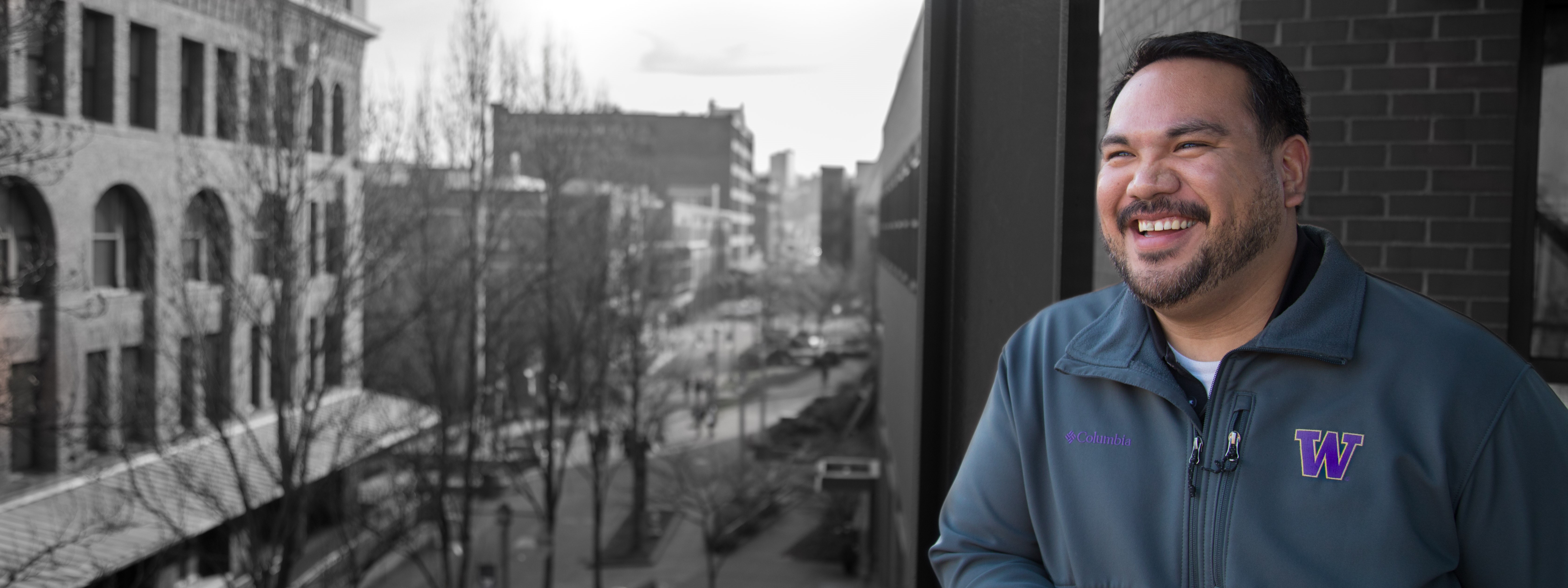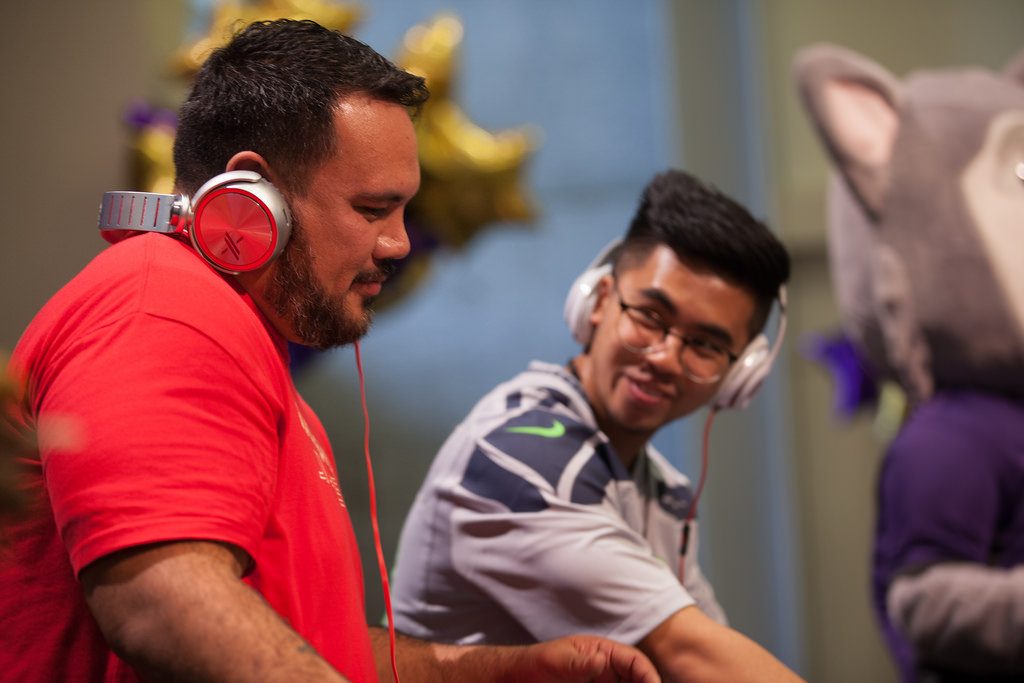
World of Possibilities
Creating a college-going culture begins in middle school for UW Tacoma's DJ Crisostomo.
Family and heritage are important to Dominic Jay Leon Guerrero Crisostomo. “My parents thought it was important to have lineage represented in my name,” said Crisostomo who is known by the abbreviated “DJ” on campus. Though born on a military base in Heidelberg, Germany, Crisostomo’s roots are firmly planted on Guam.
Crisostomo’s parents grew up on Guam, an island in the western Pacific that is a United States territory. They left when Crisostomo’s father Jose joined the Army in 1969. “My mom was pregnant at the time and my dad needed to find a career to support his family,” said DJ. The family embarked on a global trek that tracked Jose’s twenty-four-year military career. They did stints in Germany as well as time in Georgia, Missouri, Texas, and Massachusetts before finally settling in the Spanaway area following Jose’s assignment to Fort Lewis (now Joint Base Lewis-McChord).
DJ never considered English to be his best subject. “I struggled in school to get the grammar right,” he said. Following his graduation from Spanaway Lake High School, Crisostomo enrolled at Pacific Lutheran University. In something of a surprise, he ended up majoring in English literature. “I decided if I’m going to do something then I want to do something I’m not good at,” he said.
Crisostomo’s decision to major in literature led him to explore the craft of storytelling. “I fell in love with the Harlem Renaissance and post-colonial literature,” he said. “I read about people and authors from around the world but couldn’t find anything written by my people.” Crisostomo has set out to rectify this by collecting stories and other material about his family. “I want to be able to honor their experience and make that available to future generations,” he said.
Crisostomo has a large extended family. Some live in the area, but most live on Guam. “When I was younger I didn’t know much about life on the island,” he said. “I remember asking my cousins if they played ‘21’ (a basketball game) and they said ‘Bro, we don’t live in the jungle.’ ”

Nowadays, Crisostomo is well-versed in Chamorro life (the Chamorro are the indigenous people of the Mariana Islands). He regularly talks with his aunts, uncles and cousins from Guam on Skype or FaceTime. He hasn’t been able to visit them in person since 2009 owing to cost. “A round trip flight costs about $2300,” said Crisostomo. Still, he and his wife have been saving and plan to visit the island next year.
The military has played a major role in Crisostomo’s life. “I come from a long line of family members who served,” he said. Jose Crisostomo retired from the Army in 1993 but decided to reenlist in 2007 at the age of 57. “He stayed in shape and stayed in touch with the military community,” said DJ.
Jose was sent to Afghanistan where he worked as an automated logistical specialist. Jose regularly talked to his son about his future. “I remember him asking me what I wanted to do in terms of school,” said DJ Crisostomo. “I told him I wanted to get my master’s so I could run youth programs and he told me he’d find a way to transfer his benefits to me.”
During his long career, Jose Crisostomo was twice awarded the Bronze Star and also received the Purple Heart. The Army First Sergeant was killed by a roadside bomb in August of 2009. DJ worked at Mount Tahoma High School at the time helping students prepare for college. Not long after his father’s death, Crisostomo learned that Jose had successfully transferred his benefits to him.
DJ enrolled at the Evergreen State College in the fall of 2010 to pursue a master’s degree in public administration. “The military made it possible for me to go to school,” he said. “With those funds, I was also able to support two of my nieces on their path through college.” Crisostomo graduated in 2013. “Of the 34 grandchildren on my mom’s side of the family I was the first boy to get a college degree and one of the few overall to obtain a master’s,” he said.
Crisostomo came to UW Tacoma in 2014. A mentor who worked on campus asked him to apply for the position of pre-college coordinator. This encouragement, and the experience of students Crisostomo worked with at Mount Tahoma, ultimately led him here. “A lot of my former students found UW Tacoma to be a great fit and a good portion of students who went to school at other universities ended up coming back home and enrolling here,” he said.
Crisostomo likens his position at the University to a pizza. “One big slice is the Math Science Leadership Program (MSL) where I help organize curriculum, plan activities and train instructors,” he said. “Another slice is outreach with our Pathways To Promise (P2P) district partners.” Both MSL and P2P fall under the umbrella of UW Tacoma’s commitment to creating a college going culture in the greater Tacoma region. As Crisostomo puts it, “we want to be a resource for young people in this area, to show them options they may not have known existed.”
The common philosophy in higher education is to focus on high school juniors and seniors and encourage them to attend college. UW Tacoma does this well, but it also does something very different. Crisostomo and the rest of the staff in Student Transition Programs have a holistic approach that begins in middle school and doesn’t end until well after someone graduates from the University. “If you want to get kids into college then you have to start sooner than their last few years of high school,” he said.
Thousands of middle school students come to UW Tacoma every year to explore the campus and to learn more about college life. “We believe in creating customized experiences,” said Crisostomo. The visits often include short sample lessons created in partnership with faculty and led by current UW Tacoma students. “Junior high kids don’t want to listen to me, they want to listen to college students,” he said.
UW Tacoma’s approach to building a college going culture revolves in part around validation theory. “Basically, we let students know they belong here,” said Crisostomo. “It comes down to something as simple as telling them ‘you’re on a college campus today, if you can make it here today who’s to say you can’t make it back, what’s to say you can’t do this at another campus?’ ”
Family is important to Dominic Jay Leon Guerrero Crisostomo. “People won’t remember everything they do with you but they will remember how you made them feel,” he said. This ethos guides his work here at UW Tacoma. He’s helped to create a community on campus, so it’s not a stretch to say his family has grown by several thousand people.



